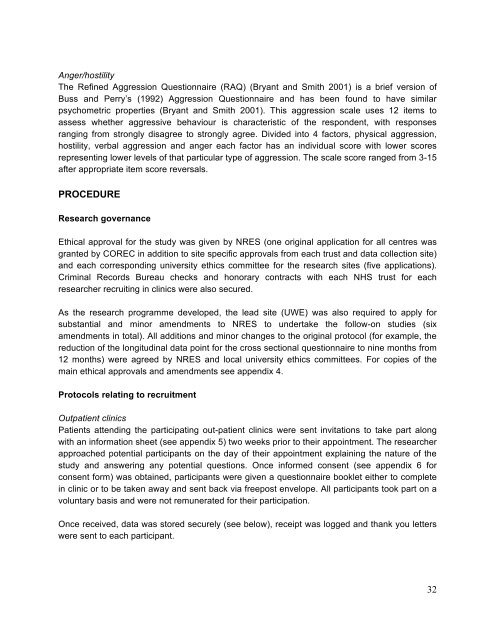Download the report - The Healing Foundation
Download the report - The Healing Foundation
Download the report - The Healing Foundation
You also want an ePaper? Increase the reach of your titles
YUMPU automatically turns print PDFs into web optimized ePapers that Google loves.
Anger/hostility<br />
<strong>The</strong> Refined Aggression Questionnaire (RAQ) (Bryant and Smith 2001) is a brief version of<br />
Buss and Perry’s (1992) Aggression Questionnaire and has been found to have similar<br />
psychometric properties (Bryant and Smith 2001). This aggression scale uses 12 items to<br />
assess whe<strong>the</strong>r aggressive behaviour is characteristic of <strong>the</strong> respondent, with responses<br />
ranging from strongly disagree to strongly agree. Divided into 4 factors, physical aggression,<br />
hostility, verbal aggression and anger each factor has an individual score with lower scores<br />
representing lower levels of that particular type of aggression. <strong>The</strong> scale score ranged from 3-15<br />
after appropriate item score reversals.<br />
PROCEDURE<br />
Research governance<br />
Ethical approval for <strong>the</strong> study was given by NRES (one original application for all centres was<br />
granted by COREC in addition to site specific approvals from each trust and data collection site)<br />
and each corresponding university ethics committee for <strong>the</strong> research sites (five applications).<br />
Criminal Records Bureau checks and honorary contracts with each NHS trust for each<br />
researcher recruiting in clinics were also secured.<br />
As <strong>the</strong> research programme developed, <strong>the</strong> lead site (UWE) was also required to apply for<br />
substantial and minor amendments to NRES to undertake <strong>the</strong> follow-on studies (six<br />
amendments in total). All additions and minor changes to <strong>the</strong> original protocol (for example, <strong>the</strong><br />
reduction of <strong>the</strong> longitudinal data point for <strong>the</strong> cross sectional questionnaire to nine months from<br />
12 months) were agreed by NRES and local university ethics committees. For copies of <strong>the</strong><br />
main ethical approvals and amendments see appendix 4.<br />
Protocols relating to recruitment<br />
Outpatient clinics<br />
Patients attending <strong>the</strong> participating out-patient clinics were sent invitations to take part along<br />
with an information sheet (see appendix 5) two weeks prior to <strong>the</strong>ir appointment. <strong>The</strong> researcher<br />
approached potential participants on <strong>the</strong> day of <strong>the</strong>ir appointment explaining <strong>the</strong> nature of <strong>the</strong><br />
study and answering any potential questions. Once informed consent (see appendix 6 for<br />
consent form) was obtained, participants were given a questionnaire booklet ei<strong>the</strong>r to complete<br />
in clinic or to be taken away and sent back via freepost envelope. All participants took part on a<br />
voluntary basis and were not remunerated for <strong>the</strong>ir participation.<br />
Once received, data was stored securely (see below), receipt was logged and thank you letters<br />
were sent to each participant.<br />
32


